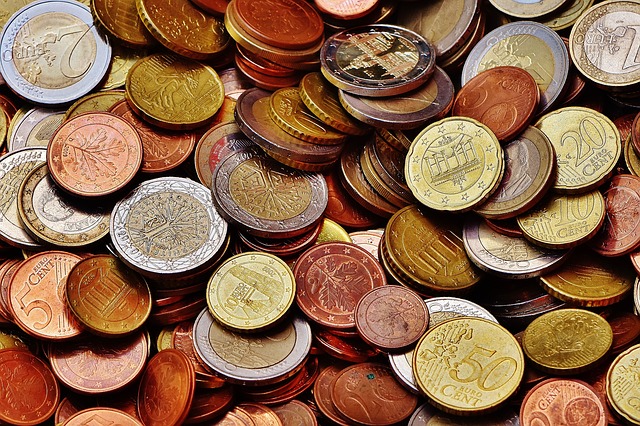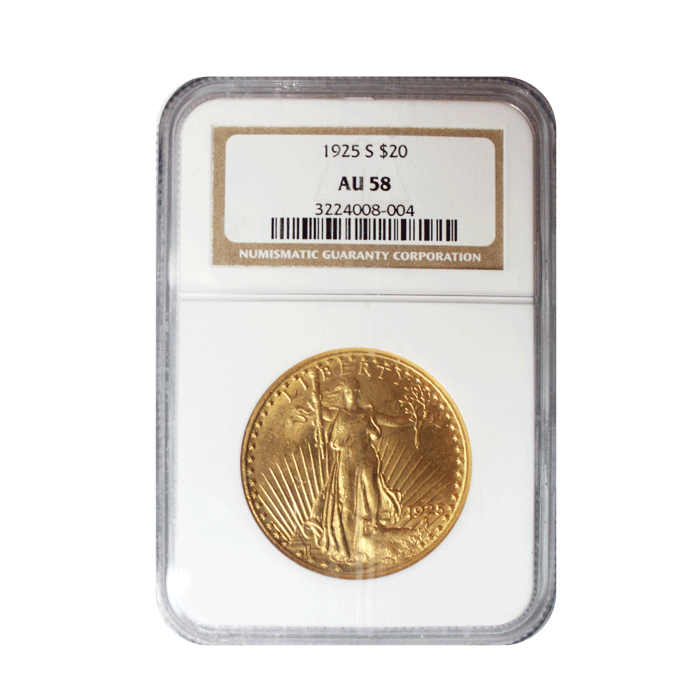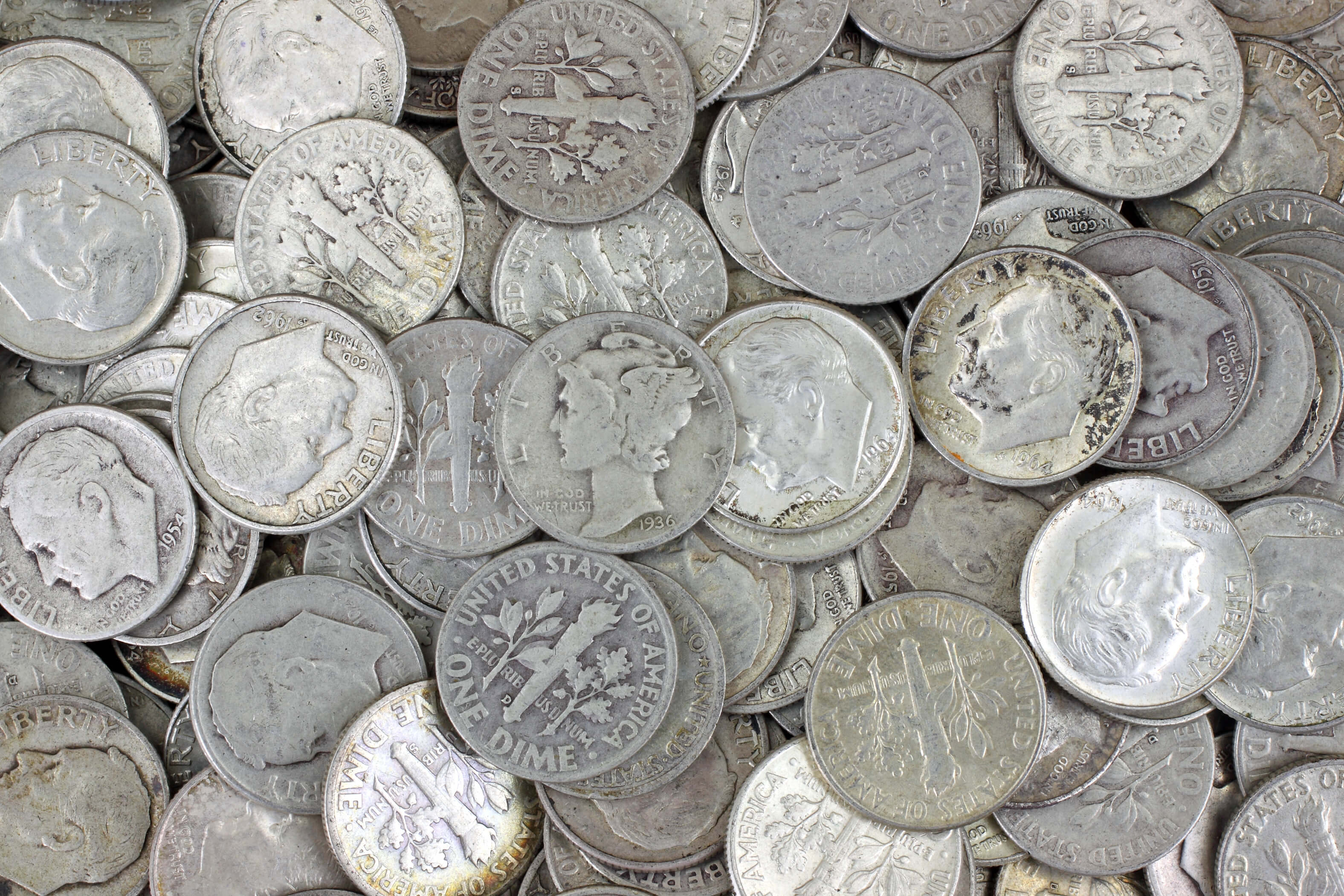How To Sell Your Old Coins
Do you have some old coins that you want to sell, but don't know where to start? All too often, people who aren't collectors fail to get the best price when selling old coins. This guide will help you become an informed seller and know if you're getting a fair price for your old coins.
WHAT TO DO BEFORE SELLING YOUR OLD COINS
Determine How Rare Your Old Coin Is
The Whitman "Red Book" Guide to US Coins can give you a general idea of the relative rarity of your coins. The prices listed are outdated, but the difference in prices between your coin's date and other dates will give an indication of how rare they may be. Use the information in the Red Book to sort your coins by denomination and rarity.
Always be careful with your coins. An additional scratch or nick can take tens or even hundreds of dollars off a rare coin's value. No need to throw money down the drain by being careless.
When it comes to old coins, cleaning counts as damage as well. A coin stripped of its patina may be shiny, but it is also lifeless. Coin collectors will pay much less for a cleaned coin, if they buy it at all.

Identifying what types of coins you have is an important first step.
Find Out the Condition of Your Old Coins
You need an idea of the condition (grade) of each coin before you can determine how much they may be worth. The Professional Coin Grading Service (PCGS) is one of the top coin grading companies in the world. You can use their Photograde™ Online resource to establish the approximate condition of your coin.
If there is any question in your mind about the grade of your coin, round down. If one side is worse than the other, go with the lower grade. Anyone you sell your coins to is going to do the same thing. Err on the side of caution to avoid disappointment later.
Find the Value of Your Old Coins
After determining the condition of a coin as best you can, start researching its value. The CDN Greysheet offers recent retail values for US coins in each grade. CDN's Greysheet and Greensheet are the most trusted price guides in the industry. Greysheet prices are just guidelines though, and local prices may differ.
Keep in mind that these prices are retail - what you would pay for the coin at a dealer. You will be offered the wholesale price so that the buyer can make a profit. Coin dealers have to eat, too.
Pro Tip: Consider Certifying Your Coins
If your old coin is sealed in a clear protective case labeled with the coin's information and a grade, all the work has been done for you! Your coin has been authenticated and graded by a professional coin grading service.

Certified 1925-S $20 American Double Eagle gold coin graded AU58 by NGC
The two largest and most popular of these "third-party grading services" are Numismatic Guaranty Company (NGC) and Professional Coin Grading Service (PCGS).
Coins that have been graded and sealed in a protective "slab" by these two companies have higher liquidity and often sell for more, compared to ungraded coins.
Where to Sell Your Old Coins In Person
Now that you have an idea of what your coins may be worth, it's time to decide where to sell them. Different types of coins have different markets. Your corner coin shop is probably not the ideal buyer for your $500 Morgan silver dollar, and a coin dealer with a fancy showroom and gold coins on display may not be the best place to sell Buffalo nickels.
Local Coin Shop
The obvious place to sell your old coins is your local coin shop. They will be your best bet for selling low- to mid-range old coins like Wheat cents, Buffalo nickels, junk silver, and scarce silver coins and silver dollars.

The Gainesville Coins luxury showroom in Lutz, Florida
Check online reviews and feedback for coin stores in your area, and choose a couple to visit. Look over their stock to see if they carry the same type of coins you're interested in selling. These dealers are more likely to want your coins and give you a fair price. Some dealers will note on their website which coins they are always interested in buying.
If a dealer has too many of the type of coins you want to sell, they will likely offer a lower price than a shop that is running short on them. This is why you want to visit more than one coin dealer. Local coin shops are not high-volume businesses, so they try to not keep money tied up in excess inventory.
Tell the owner at the start that you aren't in a rush to sell. If they make you an offer, say you'd like to think it over first. After visiting a few coin shops, you should have an idea of the prices in the local market. NEVER say that you need to sell the coin immediately. That gets you an instant markdown on the price offered.
Coin Shows
Coin shows offer the chance to meet several dealers at the same time. The largest shows have more than a hundred coin dealers set up to buy and sell. This is the place to sell that "valuable but hard to move" coin. Heritage Auctions will often offer free appraisals at major coin shows - another reason to attend.
On the other hand, dealers will be busy making sales and purchasing coins that are in demand by their customers back home. They might not have the time to devote to carefully looking over your coins, especially if they are busy. That said, if a dealer asks you to come back later, it means that they are interested in your coins. If you have coins that are in demand, you will get a good price at a coin show.

Look at all the shinies we take to coin shows!
Where to Sell Your Old Coins Online
There are several options available when selling your old coins online. The method you choose depends on your estimate of the value of your coins, and how much effort you want to put into selling them.
EBAY
eBay is one option for selling your coins online, but the high fees and dealing with bidders and buyers personally discourage many sellers from taking this route. That said, an eBay coin auction with clear, detailed photos may bring you more money than you expect.
BULLION DEALERS
Online bullion and coin dealers are another option to explore when selling your coins. Especially suited for selling bullion and slabbed coins, large online coin dealers are always in the market for old gold and silver coins as well. The big online coin dealers buy a larger range of old coins and larger collections than brick and mortar coin shops.
Some online bullion dealers only deal with large orders, refusing to make purchases of less than $1,000. Others, like Gainesville Coins, buy your coins in both large and small quantities.
MAJOR AUCTION HOUSES
If you have a popular and valuable rare coin, it might be time to talk to an auction house that specializes in rare coins. Heritage and Stack's Bowers are the two largest players in the rare coin market. Consigning your coins to a major auction house gives them exposure to a global audience of coin collectors, maximizing your chances of realizing the best price.
You should submit your coins to a third-party coin grading service like NGC or PCGS for authentication before placing them in a rare coin auction. Buyers expect coins in major auctions to be authenticated. If yours aren't, they will fetch notably lower prices.
Depending on when you consign your coins, it may be a month or two before they come up for auction. Seller's fees in large online coin auctions can compare favorably with eBay fees, and you don't have to worry about shipping to the buyer.
Places to Avoid Selling Old Coins
There are some places where you shouldn't sell your old coins. Here is the where and why:
Pawn Shops:
Pawn shops don't deal with coins, so will pay very little, if they buy them at all. After all, who searches pawn shops for old coins? They don't know how long their money would be tied up in your coin and will price their offer accordingly.Jewelry Stores:
While they may offer the random gold coin now and then, jewelry stores are not in the coin business either. You might be able to sell a coin to them, but you probably won't be getting the best price."We Buy Gold":
Any business with a "We Buy Gold" sign out front are primarily only interested in coins and jewelry for their metal content. You're unlikely to receive a good price for a rare coin here."Hotel Room" Coin Buyers:
These people travel from town to town, setting up in hotels for a few days and placing big ads in the newspaper guaranteeing high prices for coins. Their goal is to entice people who have inherited old coins to attend the event, banking that they don't know how much their coins are worth.
These people do know how much your coins are worth, but will never tell you that. Many times, they succeed in buying someone's coins for less than the melt value. It should go without saying that you should never take your coins to one of these events. No one can claim that all "hotel" gold buyers are shady, but there are too many stories of people being taken advantage of to risk it.
What If I Think My Coin Is REALLY Rare?
If you think you have a highly valuable coin, it might make sense to have it graded and authenticated by a professional coin grading service. The two largest and most popular companies are Numismatic Guaranty Company (NGC) and Professional Coin Grading Service (PCGS.) If you don't want to buy a membership to either grading service, your local coin dealer can submit your coins for you for a fee.
OLD DOES NOT AUTOMATICALLY MEAN VALUABLE.
You can buy some ancient Roman bronze coins for $2 each, as many as you want. They may be 1,700 years old, but they aren't rare, and they're not valuable.
A good way to determine the market value of an NGC/PCGS graded rare coin is by searching recent auction results at Heritage Auctions. Heritage is the world's largest coin and collectibles auction house and conducts the official auctions at many major coin shows. Searching their archives of sold coins only makes sense if you have graded (slabbed) coins.
Don't Forget About "Junk" Silver
Dimes, quarters, and half dollars minted on of before 1964 were made with 90% pure silver. People saved these not because of any numismatic value, but for their silver content. Known as junk silver, they remain a popular way to combine coin collecting and silver investment.
So, don't spend those old silver coins just because they aren't rare! Nearly all coin shops buy 90% junk silver coins. Almost every pawn shop does as well. Since junk silver is sold as a commodity, this is one situation where pawn shops and coin shops are on an equal footing.

90% silver coins usually come in the form of dimes, quarters, and half dollars.
Junk silver is one type of coin that is easy to sell over the phone. Just call around and ask what they are paying for junk silver. Since junk silver is bought and sold for its metal content, there's no worry about missing out on a big payday (unless you didn't go through the coins looking for rare ones!)
One hint: unlike other silver bullion, junk silver is usually bought and sold measured in face value, but by weight. This is because back when money was silver, the amount of silver in coins was proportional to their face value. Five pre-1965 dimes have the same total silver content as two silver quarters or one pre-1965 silver half dollar. So, when you call to ask how much someone is paying for junk silver, they will give you a quote of $X "per dollar face value".
Ready to Sell!
Now that you've put in the work, you have a good idea of what your old coins are worth. You know the pros and cons of different coin markets and can negotiate on an equal footing. Good luck on selling your old coins!
Sell Your Old Coins Online at Gainesville Coins

Steven Cochran
A published writer, Steven's coverage of precious metals goes beyond the daily news to explain how ancillary factors affect the market.
Steven specializes in market analysis with an emphasis on stocks, corporate bonds, and government debt.
